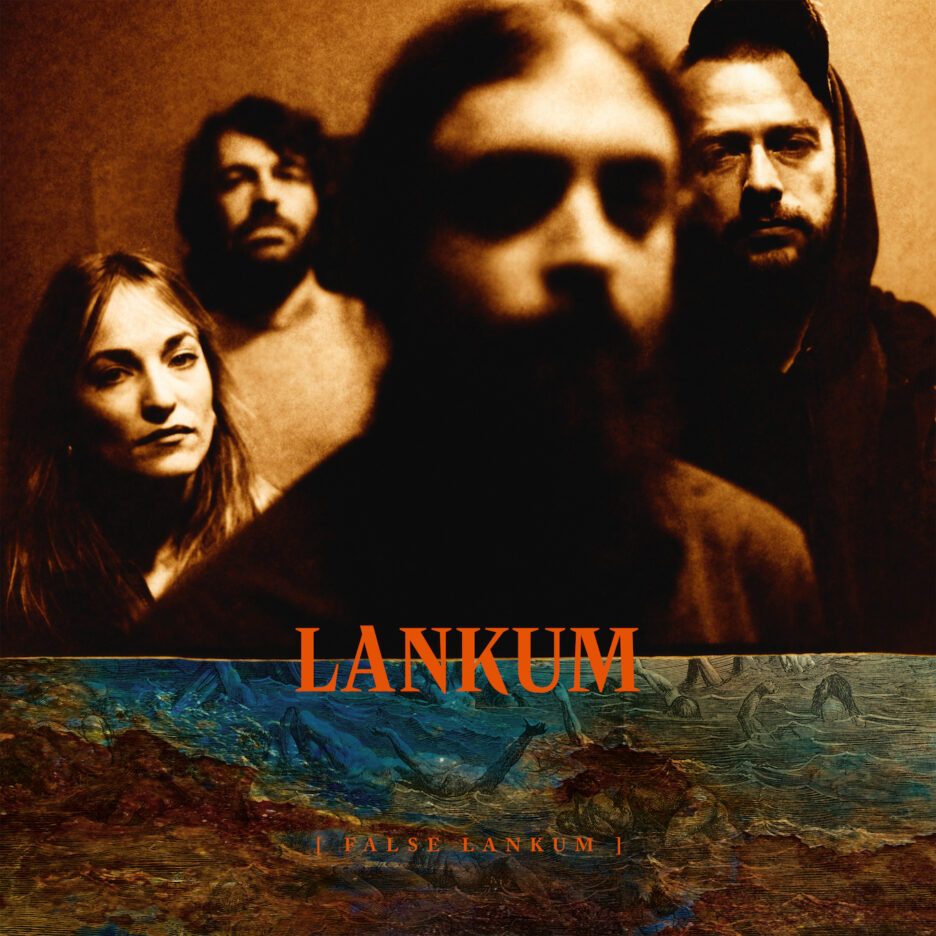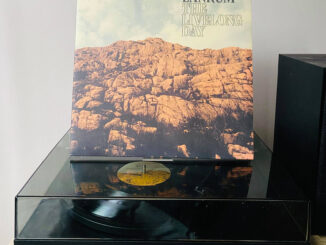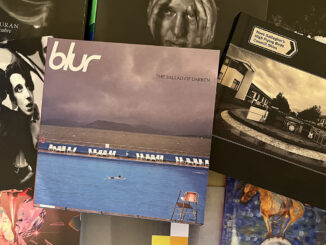Lankum cannot be accused of rapidly spitting out their recorded output. Originally known as Lynched (named after the brothers Ian and Daragh Lynch who formed the band), the band in its current manifestation was formed in 2012. False Lankum is only the fourth album to be released since then. So, the question is: do good things come to those who wait?
Dublin-based Lankum are a contemporary Irish folk four-piece band: Ian Lynch, Daragh Lynch, Cormac MacDiarmada and Radie Peat. They all take on various vocal duties as well as playing a cornucopia of instruments including guitar, concertina, uilleann pipes, vibraphone, harp and viola to name but a few. There can be no doubt that Lankum is a pool of wide and varied talents. For me, it is what they can do with these talents that I find exciting.
You see, this is not a band that makes lots of upbeat, 3-minute-long, merry ditties that musicians play in pubs across the Republic of Ireland and beyond whilst having a jolly old time. You won’t hear packed “Irish” bars in the UK singing their songs with gusto on St. Patrick’s Day as people have their annual Guinness splurge. Their latest release, False Lankum, demonstrates this with great aplomb.
A 12-track album, weighing in at almost 69 minutes long, it certainly proposes value for money. It is formed from a mix of traditional arrangements and original compositions, creating a complete piece of work, as opposed to twelve individual songs. This is not an album where you would select your favourite tracks to add to a playlist. You need to listen to the album as a whole, from beginning to end, as the band intended.
The opening gambit is ‘Go Dig My Grave’, which is also the first single released from the album. At almost nine minutes in length, this song has roots dating back to the 17th century. A song focusing on the emotions of grief; “all-consuming, unbearable and absolute” is how the band describe it. They certainly portray this with ease. The song opens with Radie Peat’s naked, haunting vocal, setting the tone for what’s to come. The melody builds throughout evoking my emotions. I feel as if I am standing on a wet and windy hillside. Desolate. Lonely. Battered. The tempo picks up in the middle of the track and you suddenly feel as if the spirits have swamped you, swirling around maniacally, creating a feeling of terror. The tempo picks up in the middle of the track and you suddenly feel as if the spirits have swamped you, swirling around maniacally, creating a feeling of terror.
As the track fades, it leads you immediately into ‘Clear Away in the Morning’. This song, about someone who paradoxically longs for the sea but also for home, delivers a brighter sound with a slight (Irish) spaghetti western feel. When the vocals finally arrive, it acts as another instrument, adding an additional texture. The voices aren’t designed to be front and centre, but the lyrics are not indecipherable either.
Following this, we encounter the first of three fugues contained within the album. These are short pieces of music which create a polyphonic texture. They are both connections between groups of songs but also like a sonic palette cleanser. A musical lemon sorbet. Whilst I do understand why these are used throughout the recording, I also feel as if the album wouldn’t have suffered without them. I can’t quite work out if I enjoy their inclusion, or if I find them an irritation.
‘Master Crowley’s’ introduces us to a more traditional sea shanty feel. You could picture yourself in an 18th-century pub near the docks whilst visiting sailors playing for pints, whilst Andrew Fearn of Sleaford Mods adds a mix of sharp and squidgy noises from the corner of the bar. Excellent! The song, based around a two-part reel, develops a slightly psychedelic feel as the song heads towards its end. What begins as jaunty moves into darker spaces, carrying a feeling of menace.
You become more aware of this sensation when ‘Newcastle’ begins to flow from your speakers. Radie Peat’s voice sounds clean and pure which jars with the melody at the end of ‘Master Crowley’s’. Carrying a more traditional folk feel, this song tells of a heartbreaking story of pain, of longing for love and for home. Peat manages to deliver the lyrics with dual emotion – part sadness, part defiance. Quite some feat. “Why should I not love my love?/Why shouldn’t my love love me?/Why should I not speed after her?/When love to all is free”. This track could have been all about wallowing in misery, but Peat’s conveyance of these lines also carries an ire and spirit.
‘Fugue II’ – makes me feel as if I was sitting in a train station. The Daragh Lynch penned ‘Netta Perseus’, a song of two halves, starts as a gentle, guitar-led ballad. A drone begins to slowly appear, bubbling away beneath the melody. It niggles at you. As the track builds, a thumping, repetitive rhythm begins to drive the track. Suddenly, the track emits an urgency which sits at odds with the first half of the song. We do not get to know who Netta Perseus is, her identity remains undisclosed. It is clear this temptress will likely lead to the downfall of the main character as he sings, “She whispers that she does adore me/But I dare not to look into those eyes”. A stony metaphor for ruin if ever there was one.
If you fancy a buoyant toe-tapper, then ‘The New York Trader’ is the one for you. We head back to the more traditional folk sound as the track draws you in with its Pogueish charm (reminiscent of ‘USA’ from The Pogues’ Peace & Love). At around three minutes and twenty seconds, you’d be excused for thinking the track had ended. Wrong. With a thwack, the song restarts, this time with a pounding beat which creates an increasing assertion and brings in a murkier feel. Eerie vocals drape over the soundscape. The song still has a traditional feel but with a contemporary twist – something Lankum excel at.
The song is from a larger group of traditional songs, sometimes referred to as the ‘Jonah Ballads’. Ian Lynch describes the song as a very dark story of a recalcitrant man who finds himself in charge of a ship. The crew and passengers realise they need to throw him overboard to be able to save themselves. Now they live in fear of the corpse emerging from the briny sea, bringing with him an army of the dead. It’s not every band that would, or could, tackle such a cheery tale. But this is Lankum. They don’t do easy or ordinary, this lot.
The album contains a theme, weaving its way throughout the recording– although the band state this was not intentional. It appears to have been a happy accident. It was only when the band put the songs together, they realised there was a maritime motif running throughout.
Keeping up the theme of lengthy tracks, ‘Lord Abore and Mary Flynn’ comes in at eight minutes and 40 seconds. And it still isn’t the longest track on offer. However, you never feel as if you are wanting these long tracks to end. No checking of watches here. If a track is long, there is a reason. This isn’t the band going all prog rock, making long songs just because they can.
This track marks the first time MacDiarmada takes on lead vocal for Lankum. His voice perfectly fits the song, cutting through composition like a laser, bringing a clean, crisp and bright feel to proceedings. Peat’s harmony bounces perfectly off this, her voice lighter of touch than usual. The beautifully picked guitar that provides the melody is a joy to listen to. It opens the soundstage, making the track feel much more immense and roomier than it actually is. It amazes me how a band can create such an exquisitely gorgeous-sounding song about a mother poisoning her son because she objects to the woman he’s chosen to marry. Who thought filicide could be so engaging?
Fugue III – my speakers shake as a bass sound emanates beneath a confused soundscape. The three fugues have been created from an improvised track titled ‘Sheep Stealer’ that was discarded. Originally a ten-minute wall of sound, producer John ‘Spud’ Murphy dissected it, played around with material and created these three sonic grenades which pepper the record. I’m still on the fence with these.
‘On a Monday Morning’, we hear a story to which many of us can connect – a longing for the weekend. Those two days of freedom, enjoyment and celebration pass by too quickly, leaving you feeling despondent come Monday morning. “Too soon to be out of bed/Too soon to be at this bus queue caper”, sings Daragh with a thick layer of despondency. The song feels like one giant sigh. You slowly draw in a large breath throughout the track and let go with a big sigh over the closing bars.
Last up sees the other original composition by Daragh Lynch. Strap yourself in for an epic. ‘The Turn’ leaves us with a positive, albeit not convincing, message. You feel as if you are on a ship, sailing off over the horizon looking for something more worthy. “Turn, we’ll find better days”, is sung by a harmony of voices. Hope keeps us going. Things must improve. There must be a pot of gold at the end of the rainbow. But life is complex, and we don’t always get the things which we crave.
As the harmony begins to drift away, as if the ship is sailing out of sight, a completely different sonic experience materialises. A drum beats a rhythm, thumping away like a heartbeat. Heavy, metallic noises replace the gentle singing. The heartbeat fades. The noises seem to drift across the speakers as if it is following the ebb and flow of the tide. It takes on the feeling of being in another world and the sheer heaviness of sound overwhelms you. Hammering. Shrieking. Growling. Stressful. And then suddenly – quiet. You feel as if you were about to be pushed over a cliff edge but there was a last-minute change of heart.
Lankum have certainly created a unique experience with False Lankum. They demonstrate a deft touch in the art of storytelling. They reveal how they can successfully inject emotion into their music, no matter what that emotion may be. They exhibit a new way to tackle traditional folk songs using modern production techniques, creating sonic masterpieces instead of just songs. They prove the future of folk music in Ireland is in good hands. It appears patience is indeed a virtue. Long may Lankum take their time. I look forward to their next album in 2026/27.





Be the first to comment